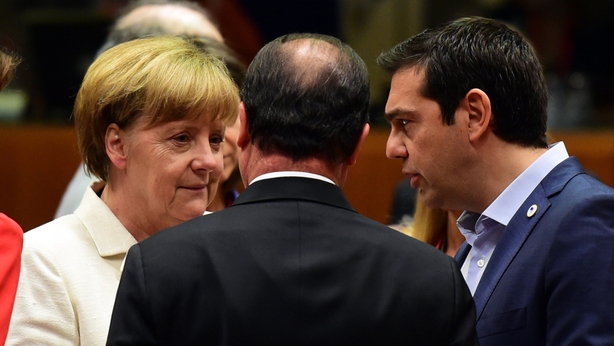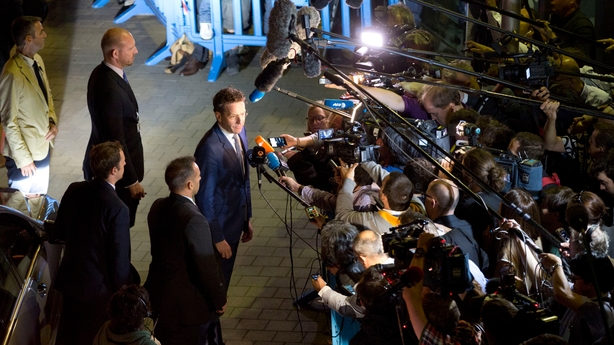Eurozone leaders have told near-bankrupt Greece at an emergency summit it must enact key reforms this week to restore trust before they will open talks on a financial rescue to keep it in the euro.
Greek Prime Minister Alexis Tsipras will be required to push legislation through parliament to convince his 18 partners in the eurozone to release immediate funds to avert a state bankruptcy and start negotiations on a third bailout programme estimated at up to €86bn.
Six sweeping measures, including tax and pension reforms, must be enacted by Wednesday night and the entire package must endorsed by parliament before talks can start, a draft decision by Eurogroup finance ministers sent to the leaders showed.
The document included a German proposal to make Greece take a "time-out" from the eurozone if it fails to meet the conditions. But not all ministers endorsed the idea, which a senior EU source said was illegal and would not survive in the summit statement.
Mr Tsipras said on arrival in Brussels he wanted "another honest compromise" to keep Europe united.
But German Chancellor Angela Merkel, whose country is the biggest contributor to eurozone bailouts, said the conditions were not yet right to start negotiations, sounding cautious in deference to mounting opposition at home to more aid for Greece.

"The most important currency has been lost and that is trust," she told reporters. "That means that we will have tough discussions and there will be no agreement at any price."
If Greece meets the conditions, the German parliament would meet on Thursday to mandate Ms Merkel and Finance Minister Wolfgang Schaeuble to open the talks on a new loan. Then Eurogroup finance ministers would meet again on Friday or at the weekend to formally launch the negotiations.
A Greek government official, in a first reaction to the draft, said: "How can they demand all these measures at the last minute without securing a lifeline to see us through till next week?"
A European official said a Eurogroup meeting tomorrow could discuss ways to provide emergency finance to keep Athens afloat.
As the summit dragged into the late evening, officials said the biggest of a series of sticking points was Germany's insistence that Greek assets worth €50bn earmarked for privatisation be placed in a trust fund in Luxembourg to be sold, with proceeds going directly to pay down debt.
One diplomat said that was tantamount to turning Greece into a "German protectorate".
Another diplomat said Ms Merkel had declared the matter a "redline" for Germany. Mr Tsipras was insisting on a stronger commitment by the creditors to restructuring Greek debt to make it more sustainable in the medium-term.
Enda Kenny backs eurozone decision on Greek reforms
Earlier, Taoiseach Enda Kenny strongly backed the decision of eurozone finance ministers.
Mr Kenny said: “I'd like to see them demonstrating - starting tomorrow in their parliament - that they are serious about implementing the changes - legislative and structural - that need to be put in place. And there are many of them.”
Taoiseach Enda Kenny says the Greek government needs to demonstrate its conviction about remaining in the eurozone https://t.co/b91h5CZnlI
— RTÉ News (@rtenews) July 12, 2015
He said the Greek government needs to “demonstrate their conviction” about remaining a member of the eurozone.
He added: “From Ireland's point of view we are quite willing to work to bring this to a conclusion.
"We don't want to look back in 10 years time and have a situation whereby this could have been saved but wasn't."
EU summit cancelled as eurozone talks continue
President of the European Council Donald Tusk earlier cancelled a crisis summit involving all 28 leaders of the EU.
The meeting of eurozone leaders will start at 3pm Irish time.
Eurozone finance ministers resumed their discussions at 10am Irish time to try to break the deadlock over Greece's third bailout.
Eurogroup chief Jeroen Dijsselbloem described yesterday's negotiations among eurozone finance ministers as "very difficult" but said they were making progress.

"We have had an in-depth discussion of the Greek proposals, the issue of credibility and trust was discussed and also of course financial issues involved, but we haven't concluded our discussions," Mr Dijsselbloem told reporters after nine hours of talks yesterday.
"It is still very difficult but work is still in progress," he said.
Ministers gave no details of yesterday's lengthy discussions but sources said there were sharp divisions over whether the latest Greek economic reform proposals go far enough to merit what would be a third bailout programme.
The EU and the IMF along with the European Central Bank bailed out Greece twice before to the tune of €240bn.
Germany has become increasingly frustrated with how Greece has implemented the debt programmes, demanding that it accept harsh austerity measures in return for fresh funding.
A German finance ministry document which came to light during yesterday's meeting but was not submitted to ministers said Berlin wanted many more concrete commitments from Greece before it could agree to a new bailout.
Failing that, then Greece should leave the eurozone for five years until it put its economic house in order, the document said, even though current rules appear to rule out such an option.
